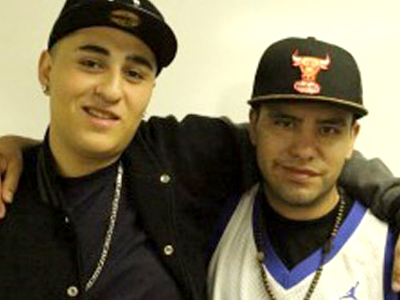
Leonardo Diarte, 22, rings a cowbell over the sound of cheers and applause. The bell-ringing is an announcement to his supporters and mentors at Garden Pathways, an education and mentoring program, of his accomplishment: Diarte has completed six months of steady employment.
For many, holding a job for six months might seem routine. But for Diarte, and thousands of Californians like him who have to traverse the difficult path from incarceration back to mainstream society, gaining steady employment is a major accomplishment and perhaps the biggest hurdle to overcome in avoiding a return trip to prison.
“My plan is to keep my job and move on up, get a house and stability for my family,” said Diarte, a husband and father of one.
Garden Pathways assists clients like Diarte in not just in filling out applications and résumés, but also with job placement through partnerships with local businesses. Through the program, Diarte was able to get a job as a welder’s apprentice.
But job placement alone doesn’t ensure success for everyone. What really made the difference for Garden Pathways client Jacob Beltran, was how his teacher, Ms. Rodriguez, treated him.
“The way Ms. Rodriguez connected with the students was different from anything I had ever seen,” said Beltran, a 19-year-old who first met Ms. Rodriguez at the Lerdo Detention Center. “She always had a smile on her face, like she wanted to be there and wanted us to be in class. She was really involved, passionate, and wanted us to grow and heal from the inside out.”
Establishing a level of trust with people transitioning out of the penal system is what distinguishes Garden Pathways from other resource providers. Juan Avila, the organization’s director of operations, noted that the relationship building begins during, not after, incarceration.
“We really stress starting our relationship with inmates while they’re still incarcerated, because many may have trusted other organizations and have been failed, or trusted family members and had that trust broken,” explained Avila.
Beltran, who was arrested for selling drugs. When he met Ms. Rodriguez while incarcerated, he began creating his new life, away from using and selling drugs.
“Five months ago I was on the run, I had a warrant out on me, but I wanted to turn my life around. So I stood out on my dad’s front yard knowing I would be arrested because I needed to get a clear record before turning my life around,” said Beltran.
Beltran’s life has turned around to such a degree that even his friends have begun looking up to him, and want to make the same transformation.
“I’ve put myself in a situation where all my friends are looking up to me. They tell me, ‘I want to be just like you,’” said Beltran, who has been off drugs for ninety days.
For Diarte, now a Garden Pathways graduate turned welder apprentice, the program doesn’t end quite yet. His mentor will continue to meet up with him for at least an hour per month. In order to achieve a thorough metamorphosis, he said, one has to have the urge to learn and take advantage of new opportunities to grow.
“Take that first opportunity you get. Don’t go back where you started, cause that’s where you’ll stay,” said Diarte. “Take that chance.”